WE CANNOT LIVE EASTER WITHOUT ENTERING INTO THE MYSTERY
 Tonight is a night of vigil. The Lord is not sleeping; the Watchman is watching over his people (cf. Ps 121:4), to bring them out of slavery and to open before them the way to freedom.
Tonight is a night of vigil. The Lord is not sleeping; the Watchman is watching over his people (cf. Ps 121:4), to bring them out of slavery and to open before them the way to freedom.
The Lord is keeping watch and, by the power of his love, he is bringing his people through the Red Sea. He is also bringing Jesus through the abyss of death and the netherworld.
This was a night of vigil for the disciples of Jesus, a night of sadness and fear. The men remained locked in the Upper Room. Yet, the women went to the tomb at dawn on Sunday to anoint Jesus’ body. Their hearts were overwhelmed and they were asking themselves: “How will we enter? Who will roll back the stone of the tomb?…” But here was the first sign of the great event: the large stone was already rolled back and the tomb was open!
“Entering the tomb, they saw a young man sitting on the right side, dressed in a white robe…” (Mk 16:5). The women were the first to see this great sign, the empty tomb; and they were the first to enter…
“Entering the tomb”. It is good for us, on this Vigil night, to reflect on the experience of the women, which also speaks to us. For that is why we are here: to enter, to enter into the Mystery which God has accomplished with his vigil of love.
We cannot live Easter without entering into the mystery. It is not something intellectual, something we only know or read about… It is more, much more!
“To enter into the mystery” means the ability to wonder, to contemplate; the ability to listen to the silence and to hear the tiny whisper amid great silence by which God speaks to us (cf. 1 Kings 19:12).
To enter into the mystery demands that we not be afraid of reality: that we not be locked into ourselves, that we not flee from what we fail to understand, that we not close our eyes to problems or deny them, that we not dismiss our questions…
To enter into the mystery means going beyond our own comfort zone, beyond the laziness and indifference which hold us back, and going out in search of truth, beauty and love. It is seeking a deeper meaning, an answer, and not an easy one, to the questions which challenge our faith, our fidelity and our very existence.
To enter into the mystery, we need humility, the lowliness to abase ourselves, to come down from the pedestal of our “I” which is so proud, of our presumption; the humility not to take ourselves so seriously, recognizing who we really are: creatures with strengths and weaknesses, sinners in need of forgiveness. To enter into the mystery we need the lowliness that is powerlessness, the renunciation of our idols… in a word, we need to adore. Without adoration, we cannot enter into the mystery.
Pope Francis, Holy Saturday, 4 April 2015
25 di attivita’ del CAMILLIAN SOCIAL CENTER DI SAMPRAN
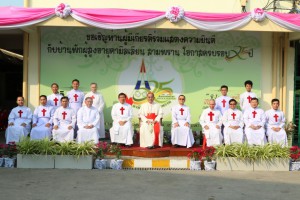 On 13 February 2016 the Camillian Social Center of Sampran celebrated its twenty-fifth anniversary of service to elderly people. The majority of them are not self-sufficient and at the present time they number about 130. The new Cardinal of Bangkok, Msgr. Francesco Saverio Kriengsak Kovitwanij, presided over the religious service. He wanted to visit those of our guests who are most in difficulty and expressed all of his appreciation of this activity of ours and the Camillian charism which is especially clear and forms an inherent part of what Jesus asked his apostles to do. The event witnessed the participation of benefactors, friends, religious of other institutes, relatives of our guests and many of the faithful who attend our chapel. Our students animated the Holy Mass in cooperation with the sightless girls of the Salesian sisters.
On 13 February 2016 the Camillian Social Center of Sampran celebrated its twenty-fifth anniversary of service to elderly people. The majority of them are not self-sufficient and at the present time they number about 130. The new Cardinal of Bangkok, Msgr. Francesco Saverio Kriengsak Kovitwanij, presided over the religious service. He wanted to visit those of our guests who are most in difficulty and expressed all of his appreciation of this activity of ours and the Camillian charism which is especially clear and forms an inherent part of what Jesus asked his apostles to do. The event witnessed the participation of benefactors, friends, religious of other institutes, relatives of our guests and many of the faithful who attend our chapel. Our students animated the Holy Mass in cooperation with the sightless girls of the Salesian sisters.
BURKINA FASO
 On Thursday 3 March 2016, the Secretary General of the United Nations, Mr. Ban Ki-moon, visited the Hôpital Saint Camille of Ouagadougou (HOSCO), paying especial attention to the department for the treatment of children who are HIV-positive. This was a precious sign of recognition of the service and the role of our Camillian religious brothers of Burkina Faso! Like St. Camillus, they too are builders of peace and reconciliation, attending to the health of the sick and the poor!
On Thursday 3 March 2016, the Secretary General of the United Nations, Mr. Ban Ki-moon, visited the Hôpital Saint Camille of Ouagadougou (HOSCO), paying especial attention to the department for the treatment of children who are HIV-positive. This was a precious sign of recognition of the service and the role of our Camillian religious brothers of Burkina Faso! Like St. Camillus, they too are builders of peace and reconciliation, attending to the health of the sick and the poor!
 Our religious brothers of Burkina Faso are preparing to celebrate the fiftieth anniversary of the presence of the Camillians in their country. This is the logo chosen for their jubilee.
Our religious brothers of Burkina Faso are preparing to celebrate the fiftieth anniversary of the presence of the Camillians in their country. This is the logo chosen for their jubilee.
‘When he had finished speaking he said to Simon: ‘Go out into deep water and throw out your nets for the catch!’ (Lk 5:4)
MADRID EXCHANGE
 The international meeting of directors of centres for pastoral care in health and Camillian universities will be held on 21-24 April 2016 at the Centre for the Humanisation of Health of Tres Cantos (Madrid). The aim of this meeting is to establish and strengthen cooperation between centres for formation and universities with a Camillian approach in order to promote health and the defence of the right to access to treatment and care.
The international meeting of directors of centres for pastoral care in health and Camillian universities will be held on 21-24 April 2016 at the Centre for the Humanisation of Health of Tres Cantos (Madrid). The aim of this meeting is to establish and strengthen cooperation between centres for formation and universities with a Camillian approach in order to promote health and the defence of the right to access to treatment and care.
VALENCIA: Camillians and Jesuits together for a project of solidarity
A work of consultation that flanks health-care services.
The Camillians and the Jesuits opened on 1 March of this year in Valencia a new consultation centre for poor people afflicted by family crises, traumatic events, depression, and the pain of migration. This is service to give help that supplements the help offered by the health-care services.
http://news.gesuiti.it/valencia-chi-ascolta-i-senza-voce-un-centro-con-camilliani-e-gesuiti/
THAILAND
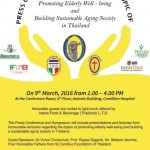 On 9 March of this year, at the Camillian Hospital (Bangkok, Thailand), a conference was held on the problems of elderly people and social policies connected with this social and health-care challenge.
On 9 March of this year, at the Camillian Hospital (Bangkok, Thailand), a conference was held on the problems of elderly people and social policies connected with this social and health-care challenge.
A group of our Camillian religious brothers of the Province of Thailand in recent days has been engaging in a few days of spiritual retreat and formation on the subject ‘Community Life and Fraternal Correction According to the Provocation of Pope Francis about Religious Life’.
The course has been animated by Sister Myrian Kitcharoen, following the model of sharing. Sister Myrian Kitcharoen was Mother General of the St. Paul del Chartre Congregation in Rome for twelve years. As such, she has also been able to share all of her practical experience on the subject of religious life.
THE PHILIPPINES
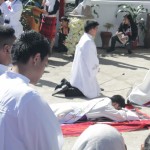 The Province of the Philippines celebrated the priestly ordination of Fr. Henry Bosoen Angupa II, the first Camillian from Moun, a northern Province of the Philippines, and of Fr. Seo Jung Ju, the first Camillian from Korea, who is from the city of Busan in South Korea.
The Province of the Philippines celebrated the priestly ordination of Fr. Henry Bosoen Angupa II, the first Camillian from Moun, a northern Province of the Philippines, and of Fr. Seo Jung Ju, the first Camillian from Korea, who is from the city of Busan in South Korea.
Cf. We here share with you up-dating on, and the ‘Camillian life’ of, the Province of the Philippines through its newsletter – CamUp
TAIWAN
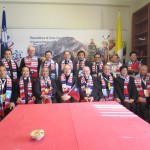 We here share with you a small note of an inter-cultural character to which our religious brothers who have lived for decades in Taiwan are very sensitive. On 8 February of this year the new Chinese lunar year was celebrated – the Year of the Monkey! In all the churches of the country a Holy Mass for the new year was celebrated, with special remembrance of people’s ancestors!
We here share with you a small note of an inter-cultural character to which our religious brothers who have lived for decades in Taiwan are very sensitive. On 8 February of this year the new Chinese lunar year was celebrated – the Year of the Monkey! In all the churches of the country a Holy Mass for the new year was celebrated, with special remembrance of people’s ancestors!
 Our Church dedicated to St. Camillus was chosen by the bishop of the diocese of Taipei as a jubilee church for the acquiring of holy indulgences. Fr. Giuseppe Didonè, together with another seventeen priests, went to Rome to receive the mandate from the Pope as a missionary of mercy.
Our Church dedicated to St. Camillus was chosen by the bishop of the diocese of Taipei as a jubilee church for the acquiring of holy indulgences. Fr. Giuseppe Didonè, together with another seventeen priests, went to Rome to receive the mandate from the Pope as a missionary of mercy.
On 12 February of this year the Vice-President of the Chinese Republic of Taiwan visited the Church of St. Camillus: thus was a sign of clear appreciation of, and esteem for, the work, which goes back over fifty years, that the Camillians have been engaged in to help sick and poor people.
BRAZIL – THE LAY CAMILLIAN FAMILY
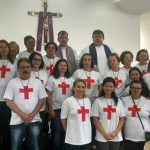 On 28 February of this year the Lay Camillian Family officially came into existence in San Paolo (Brazil).
On 28 February of this year the Lay Camillian Family officially came into existence in San Paolo (Brazil).
On that occasion Father Leocir Pessini concelebrated Holy Mass together with Fr. Zaqueu Geraldo Pinto, the Master of the Camillian Novitiate and spiritual assistant to the new group.
MADAGASCAR
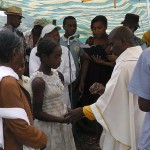 Fr. Albert Rainiherinoro has updated us in a precise way on the celebration of the World Day of the Sick in Fianarantsoa (Madagascar).
Fr. Albert Rainiherinoro has updated us in a precise way on the celebration of the World Day of the Sick in Fianarantsoa (Madagascar).
On Saturday 13 February 2016 about 2,000 pilgrims met at the tower of Madona Salus Infirmorum to celebrate the World Day of the Sick: the pathway of the via crucis; the recital of the rosary; the celebration of the sacrament of reconciliation thanks to the availability of six priests who were present; the celebration of the Eucharist presided over by the Vicar General, Don Gervais Razafitoazaza; and the ministering of the sacrament of the anointing of the sick to those sick people who were present. Special thanks go to the inhabitants of Ilena who with great readiness to help and solidarity helped the sick people to reach the place of the celebration notwithstanding the difficulties that exist in gaining access to it.
ROME – the Generalate House
Meeting for formation for Provincial economic administrators and those who work with them.
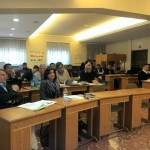 The General Consulta, as a part of its activities planned for the year 2016, called a meeting for formation for economic administrators of Provinces, Vice-provinces and Delegations.
The General Consulta, as a part of its activities planned for the year 2016, called a meeting for formation for economic administrators of Provinces, Vice-provinces and Delegations.
This meeting formed one of the priorities of the General Consulta for this six-year period and its aim was to achieve greater effectiveness in terms of economic transparency and vigilance. It also part of the response to a request of the Congregation for Institutes of Consecrated Life and Societies of Apostolic Life (see the circular letter of 2 August 2014 entitled ‘Guidelines for the Management of Possessions in Institutes of Consecrated Life and in Societies of Apostolic Life’).
The principal focus of the meeting was on formation and practical exercises (in the style of a seminar-workshop) regarding the drafting and presentation (respecting contents, forms and times previously established) of a complete annual report of a Province, Vice-Province or Delegation, as requested by the General Consulta.
About thirty people took part in this initiative: Camillian religious responsible for the economic management of almost all the geographical areas of the Order together with some lay people who work closely with them.
The meeting took place in Rome at the religious house of the Daughters of Charity (Canossians), on 14-18 March 2016.
Cf. Message of the General Superior to those taking part in the meeting of financial administrators of the Order of Camillians INGLESE FRANCESE SPAGNOLO ITALIANO
ROME – the Rectory of the Church of St. Mary Magdalene
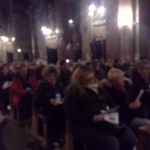 On Friday 11 March, Friday 15 April and Friday 13 May about 300 people who belong to groups of medical doctors, nurses and physiotherapists of the U.N.I.T.A.L.S.I. (the National Italian Union for the Transport of Sick People to Lourdes and International Sanctuaries, its section of the North, Centre and South of Italy) will visit the Church of St. Mary Magdalene and the adjoining museum that stewards the memory of St. Camillus, as a moment of formation in preparation for the Jubilee of Sick and Disabled People (10-12 June 2016) which will be celebrated in the Vatican and will forms a part of the context of the Holy Year of Mercy.
On Friday 11 March, Friday 15 April and Friday 13 May about 300 people who belong to groups of medical doctors, nurses and physiotherapists of the U.N.I.T.A.L.S.I. (the National Italian Union for the Transport of Sick People to Lourdes and International Sanctuaries, its section of the North, Centre and South of Italy) will visit the Church of St. Mary Magdalene and the adjoining museum that stewards the memory of St. Camillus, as a moment of formation in preparation for the Jubilee of Sick and Disabled People (10-12 June 2016) which will be celebrated in the Vatican and will forms a part of the context of the Holy Year of Mercy.
PUBLISHING SUGGESTION
The proceedings of the twenty-first General Assembly of the Members of the Pontifical Academy for Life 2015, entitled ‘Assisting the Elderly and Palliative Care’, have been recently published.
You can download here the paper by Fr. Leocir Pessini on the subject ‘Ethical and Pastoral Guidelines for a ‘Good Accompaniment’’.
NEW THINGS
 We would like to draw your attention to the publication of the book ‘Beato Luigi Tezza. Apostolo dell’amore di Dio’ (‘Blessed Luigi Tezza. Apostle of the Love of God’), edited by our religious brother Fr. Antonio Casera and published by Velar.
We would like to draw your attention to the publication of the book ‘Beato Luigi Tezza. Apostolo dell’amore di Dio’ (‘Blessed Luigi Tezza. Apostle of the Love of God’), edited by our religious brother Fr. Antonio Casera and published by Velar.
MEXICO
On 12-18 February 2016 Fr. Leocir Pessini visited our religious brothers of the Camillian community of Guadalajara, Mexico.
Below you can read the message of thanks, good wishes, encouragement and strong call to growth that Fr. Leocir sent to these religious brothers of ours at the end of his presence amongst them.
Cf. Message of the Superior General to the Camillian community of Guadalajara, Mexico ITALIANO INGLESE PORTOGHESE SPAGNOLO
THE PROVINCE OF ROME
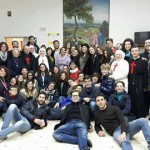 We would like to share with you some snapshots of the week of Camillian parish mission in Campi Salentina, Lecce: a mission to ordinary people of evangelisation and comfort for the sick which our religious brothers of the Province of Rome, the Daughters of St. Camillus and a large group of young people animated with notable ‘success’ on 14-21 February 2016.
We would like to share with you some snapshots of the week of Camillian parish mission in Campi Salentina, Lecce: a mission to ordinary people of evangelisation and comfort for the sick which our religious brothers of the Province of Rome, the Daughters of St. Camillus and a large group of young people animated with notable ‘success’ on 14-21 February 2016.
THE PROVINCE OF NORTH ITALY
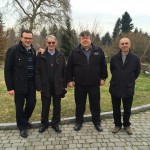 On 21-23 February 2016 the Superior General ended his meetings with the communities and the religious of the Province of North Italy by visiting the Camillian women religious of Cremona, Como and Besana Brianza. On Tuesday 23 February of this year the morning was dedicated to the meeting with the General Assembly of the Province in order to have a fraternal exchange of ideas, projects and aspirations about the present and the future of our Camillian consecrated lives.
On 21-23 February 2016 the Superior General ended his meetings with the communities and the religious of the Province of North Italy by visiting the Camillian women religious of Cremona, Como and Besana Brianza. On Tuesday 23 February of this year the morning was dedicated to the meeting with the General Assembly of the Province in order to have a fraternal exchange of ideas, projects and aspirations about the present and the future of our Camillian consecrated lives.
Cf. Message of the Superior General to the Province of North Italy SPAGNOLO INGLESE
AGENDA OF THE SUPERIOR GENERAL AND THE GENERAL CONSULTA
The Superior General, during the week of 29 February-4 March, in the diocese of Joinville, Brazil, animated a course of formation entitled ‘Ética, Bioetica, pastoral em tempos de globalization!’. A large number of diocesan priests and religious took part in the meeting.
On 8-19 March 2016, Fr. Leocir together with Fr. Laurent Zoungrana, the Vicar General, will visit our religious brothers of the Camillian communities of Madagascar, Central Africa and the Ivory Coast.
On Tuesday 22 March 2016, the Superior General and the members of the general Consulta will meet for a day of assessment and planning at the generalate house of the women Ministers of the Sick of St. Camillus (Rome).
On 4-13 April 2016, the Superior General together with Fr. Laurent Zoungrana, the Vicar General, will meet the communities and our religious brothers of the Province of France.
On 15-27 April 2016, Fr. Leocir together with Fr. Laurent Zoungrana, the Vicar General, will visit our religious brothers of the Camillian communities of Anglophone Africa: Kenya, Tanzania and Uganda.
DECISIONS OF THE GENERAL CONSULTA
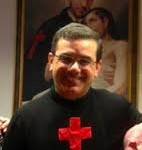 Approval of the appointment of Br. Carlo Mangione as Provincial economic administrator of the Province of Sicily and Naples
Approval of the appointment of Br. Carlo Mangione as Provincial economic administrator of the Province of Sicily and Naples
The canonical erection of the ‘Divine Mercy’ Religious House in Pattanakan, Bangkok (Thailand).
The Women Religious THE DAUGHTERS OF ST. CAMILLUS
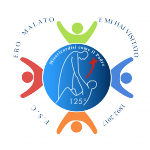 The Daughters of St. Camillus are preparing to celebrate the important achievement of the 125th anniversary of the foundation of the Institute. A special internet site has been created for the occasion, (http://concuoredimadre.wix.com/fscamilliane), which will bring together all the events and news of their jubilee. For the occasions a logo has also been created which is a summarising expression of their project for consecrated life.
The Daughters of St. Camillus are preparing to celebrate the important achievement of the 125th anniversary of the foundation of the Institute. A special internet site has been created for the occasion, (http://concuoredimadre.wix.com/fscamilliane), which will bring together all the events and news of their jubilee. For the occasions a logo has also been created which is a summarising expression of their project for consecrated life.
The Women Religious MINISTERS OF THE SICK OF ST. CAMILLUS
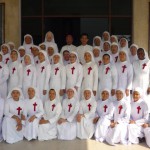 The triennial assembly of the Institute took place in Thailand on 3-6 March, with the presence of the Mother General Sr. Lauretta Gianesin and Sr. Rebecca, a General councillor.
The triennial assembly of the Institute took place in Thailand on 3-6 March, with the presence of the Mother General Sr. Lauretta Gianesin and Sr. Rebecca, a General councillor.
Missionarie degli Infermi
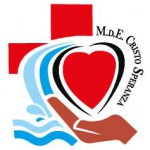 The new site of the Secular Institute of the Women Missionaries of the Sick Christ the Hope has been on-line for a number of days. You can consult it by clicking here .
The new site of the Secular Institute of the Women Missionaries of the Sick Christ the Hope has been on-line for a number of days. You can consult it by clicking here .
CAMILLIANS ON INSTAGRAM
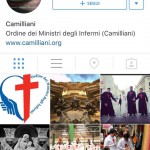 It is with great pleasure that we announce the arrival of the Camillians on #Instagram, one of the best photographic social networks in circulation. Henceforth you will be able to find us there as well! We are waiting for you!!!
It is with great pleasure that we announce the arrival of the Camillians on #Instagram, one of the best photographic social networks in circulation. Henceforth you will be able to find us there as well! We are waiting for you!!!
DECEASED RELIGIOUS
‘See, now they vanish, the faces and places, with the self which, as it could, loved them. To become renewed, transfigured, in another pattern’ (T.S. Eliot)
On 15 February 2016, at 23.50, while he was blessing the dead body of a woman in the nephrology department, Fr. Pasquale Anziliero died suddenly as the result of a heart attack at the age of forty-nine.
 Fr. Pasquale experienced twenty years of religious life and the priesthood. Are they few in number? Who knows? During this short period of time, however, he bequeathed to us an outline of himself that will certainly remain. We will remember him as a man of a good spirit, generous, lovable, attentive to people, who when he gave his friendship really gave it, and he made people feel this every day: with a still boyish heart he enjoyed playing with his nephews or with the dogs of his friends and his mother’s cat, laughing like a child at other people’s jokes. He was a man who preferred to listen to, and to support, other people rather than to confide to others his own troubles; he was a brother who was always ready to comfort and to support both patients and health-care workers whom, indeed, he invited to go on pilgrimages or to take part in cultural moments or ones involving formation.
Fr. Pasquale experienced twenty years of religious life and the priesthood. Are they few in number? Who knows? During this short period of time, however, he bequeathed to us an outline of himself that will certainly remain. We will remember him as a man of a good spirit, generous, lovable, attentive to people, who when he gave his friendship really gave it, and he made people feel this every day: with a still boyish heart he enjoyed playing with his nephews or with the dogs of his friends and his mother’s cat, laughing like a child at other people’s jokes. He was a man who preferred to listen to, and to support, other people rather than to confide to others his own troubles; he was a brother who was always ready to comfort and to support both patients and health-care workers whom, indeed, he invited to go on pilgrimages or to take part in cultural moments or ones involving formation.
He was a man consecrated to the Kingdom who was open to the new challenges of pastoral care and who trained himself in the right way, at times with courses on management if he had to work in the administration of a nursing home, and at other times with courses on pastoral counselling in order to improve his ability to listen to sick people. He was an evangeliser who used all forms of information and communications technology to reach as many people as possible. As a man and as a religious he lived the ethic of work: time had to be used and given that in the end there were so many things to do, what always had to be abandoned was sleep.
St. Camillus said: ‘just as a sailor dies at sea, so a Good Minister of the Sick dies in a hospital amongst the sick’. Father Pasquale died exactly like that. He was on duty. Called at 23.00 to bless a woman who had just died, while he was speaking the last words of the Hail Mary he was struck down by a heart attack and collapsed.
Cf. ‘A fine death. In memory of Fr. Pasquale’ (funeral homily by Fr. Edoardo Gavotti)
 The Camillian Province of Spain has announced the death of their religious brother Fr. Miguel Aguilar which took place on 20 February 2016 in Sant Pere de Ribes (Barcelona) after seventy years of consecration to service to the sick.
The Camillian Province of Spain has announced the death of their religious brother Fr. Miguel Aguilar which took place on 20 February 2016 in Sant Pere de Ribes (Barcelona) after seventy years of consecration to service to the sick.
On 21 February Sr. Firmina Degetto, a woman religious of the Daughters of St. Camillus, went to heaven. Her death took place in Cremona at the community of the clinic of the Institute. Sr. Firmina died at the age of eighty-eight, after sixty-nine years of religious profession.
The Community of the Daughters of St. Camillus have announced the death of Sr. Silvia Callegaro which took place on 26 February 2016 in the San Giuseppe Nursing Home of Brescia. Sr. Silvia died at the age of ninety-eight, after sixty-three years of religious consecration.
 On Sunday 28 February 2016, in Verona, our religious brother Fr. Carmelo Fedrizzi (a religious of the Province of North Italy) died at the age of ninety.
On Sunday 28 February 2016, in Verona, our religious brother Fr. Carmelo Fedrizzi (a religious of the Province of North Italy) died at the age of ninety.
In his Camillian ministry he was always, and only, a hospital chaplain, refining how to be near to people who were suffering because of their health. He loved patients and took people to his heart; he formed ties of friendship and fraternity that were fine and long-lasting.
He was a religious of a simple, hidden and humble faith, but also a faith that was profoundly marked by his humanity. He did not love external demonstrations of his faith but, rather, he prayed a great deal, perhaps preferring personal prayer to communal prayer.
Fr. Carmelo did not want to bother anybody; he was shy when paid a compliment; he almost never liked talking about himself; and he preferred to speak about other people or to talk more about things that had been done rather than feelings that he experienced or the wishes that he had in his heart. Of an agreeable character and good company, he had the spirit of a child; he loved bicycling and even more walking races, an amateur sport that he himself practised assiduously as long as he was able to do so. He was a formidable walker! During his retirement he complained of pains in his feet and his legs; in truth what he most wore out were his shoes. It was as if he was stamping his feet, and he certainly suffered the immobility that was imposed on him by his last admission to hospital.
Provincial Father, Siegmund Malinowski (German Province) wants to inform that in the early morning of March 14, 2016 the Lord called our beloved confrere FR. DR. JOHANNES UHRMANN (88) in the eternal home. R.I.P.
Obituary will follow.
Please, remember fr. Johannes in your prayers.
‘Now they live in Christ whom they met in the Church, followed in our vocation, and served in the sick and the suffering. Trusting that the Lord, the Holy Virgin our Queen, St. Camillus, the Blessed Luigi Tezza and the Blessed Giuseppina Vannini, and our deceased religious brothers and sisters, will welcome them in their midst, we commend them in our prayers, remembering them with affection, esteem and gratitude’.
THE HOLY YEAR OF MERCY
The New Humanism in Jesus Christ
 At the centre is Jesus, our light: “Ecce Homo”. Looking at this dome we are drawn upward, as we contemplate the transformation of Christ judged by Pilate, into Christ seated on the judge’s throne. An angel brings him a sword yet Jesus does not take on the symbols of judgment, but instead raises his right hand, showing the marks of the passion, because he “gave himself as a ransom for all” (1 Tim 2:6). “For God sent the Son into the world, not to condemn the world, but that the world might be saved through him” (Jn 3:17).
At the centre is Jesus, our light: “Ecce Homo”. Looking at this dome we are drawn upward, as we contemplate the transformation of Christ judged by Pilate, into Christ seated on the judge’s throne. An angel brings him a sword yet Jesus does not take on the symbols of judgment, but instead raises his right hand, showing the marks of the passion, because he “gave himself as a ransom for all” (1 Tim 2:6). “For God sent the Son into the world, not to condemn the world, but that the world might be saved through him” (Jn 3:17).
We can speak of humanism only starting from the centrality of Jesus, discovering in him the traits of the authentic will of man. It is contemplating the face of Jesus died and risen that recomposes our humanity and also that which has been fragmented through the toils of life or marked by sin. We must not domesticate the power of the face of Christ. His face is the image of his transcendence. It is the misericordiae vultus. Let us allow ourselves to be looked at by him. Jesus is our humanism. Let us always be unsettled by his question: “who do you say that I am?” (Mt 16:15).
In looking to his face, what do we see? First of all the face of an “emptied” God, of a God who has taken on the condition of servant, humbled and obedient unto death (cf. Phil 2:7). Jesus’ face is similar to that of so many of our brothers and sisters, humiliated, rendered slaves, emptied. God took on their face. And that face looks at us. God — who is “the being than which no greater can be conceived”, as St Anselm said, or the Deus semper maior of St Ignatius of Loyola — becomes ever greater than himself by lowering himself. If we do not lower ourselves we cannot see his face. We will see nothing of his fullness if we do not accept that God emptied himself. And therefore we will understand nothing of Christian humanism and our words will be beautiful, cultured, refined, but they will not be words of faith. They will be words that resound of emptiness.
The Christian humanism is the humanism of the “mind of Christ Jesus” (Phil 2:5). They are not abstract provisional sensations of the spirit, but represent the warm interior strength that renders us able to live and make decisions. What are these sentiments?
The first sentiment is humility. “Let each of you in humility count others better than yourselves (cf. Phil 2:3), says St Paul to the Philippians. Further on the Apostle speaks of the fact that Jesus did not consider equality with God a “privilege” (cf. Phil 2:6). There is a precise message here. Obsession with preserving one’s glory, one’s “dignity”, one’s influence must not play a part in our sentiments. We must seek the glory of God, and this does not coincide with our own. The glory of God which is ablaze in the humility of the grotto of Bethlehem or in the dishonour of the Cross of Christ always astonishes us.
Another sentiment of Jesus which gives shape to Christian humanism is “disinterest”. “Let each of you look not only to his own interests, but also to the interests of others” (Phil 2:4), St Paul asks again. Thus, more than disinterest, we must seek the happiness of those who are beside us. Christian humanity always goes forth. It is not narcissistic or self-referential. When our heart is rich and is so self-satisfied, then it has no more room for God. Let us avoid “remaining shut up within structures which give us a false sense of security, within rules which make us harsh judges, within habits which make us feel safe” (Apostolic Exhortation Evangelii Gaudium, n. 49).
Our duty is to work so as to make this world a better place and to fight. Our faith is revolutionary through an impulse that comes from the Holy Spirit. We must follow this impulse in order to go out of ourselves, to be men and women in accord with the Gospel of Jesus. Any life is decided by the capacity to give oneself. It is there that one transcends oneself, that one becomes fruitful.
Another sentiment of Christ Jesus is that of “beatitude”. A Christian is blessed, having the joy of the Gospel within him- or herself. In the Beatitudes the Lord shows us the way. Travelling along it we human beings can reach the most authentically human and divine happiness. Jesus speaks of a happiness that we experience only when we are poor in spirit. For the great saints beatitude has to do with humiliation and poverty. But even in the humblest part of our people there is a great deal of this beatitude: it is that of one who knows the treasure of solidarity, of sharing even the little that one possesses; the treasure of the daily sacrifice of a job, hard and poorly paid at times, but performed out of love for loved ones; and also that of one’s poverty, which however, when lived with trust in the providence and mercy of God the Father, nourishes a great humility.
Humility, disinterest, beatitude: these are the three traits that I wished to present today for your meditation on Christian humanism which is born from the humanity of the Son of God. These traits tell us that we must  not be obsessed with “power”, even when it takes on the face of a useful and functional power in the social image of the Church. If the Church does not assume the sentiments of Jesus, she gets disoriented, she loses her way. If she instead assumes them, she is able to live up to her mission. The sentiments of Jesus tell us that a Church that thinks of herself and of her own interests would be sad. The Beatitudes, after all, are the mirror in which we see ourselves, the one that allows us to know whether we are walking on the right path: it is a mirror that does not lie.
not be obsessed with “power”, even when it takes on the face of a useful and functional power in the social image of the Church. If the Church does not assume the sentiments of Jesus, she gets disoriented, she loses her way. If she instead assumes them, she is able to live up to her mission. The sentiments of Jesus tell us that a Church that thinks of herself and of her own interests would be sad. The Beatitudes, after all, are the mirror in which we see ourselves, the one that allows us to know whether we are walking on the right path: it is a mirror that does not lie.
A Church that presents these three traits — humility, disinterest, beatitude — is a Church that is able to recognize the action of the Lord in the world, in culture, in the everyday life of the people: “I prefer a Church which is bruised, hurting and dirty because it has been out on the streets, rather than a Church which is unhealthy from being confined and from clinging to its own security. We do not work for a Church concerned with being at the centre and which then ends by being caught up in a web of obsessions and procedures” (Evangelii Gaudium, n. 49).
We must always remember, however, that authentic humanism does not exist unless it contemplates love as a bond between human beings, be it of an interpersonal, intimate, social, political or intellectual nature. Rooted herein is the need for dialogue and encounter in order to build together with others in civil society. We know that the best response to conflicts of human beings, from the well-known homo homini lupus of Thomas Hobbes is the “Ecce homo” of Jesus who does not recriminate, but welcomes and, paying in person, saves.
One could say that today we are not living an epoch of change so much as an epochal change. The situations that we are living in today therefore pose new challenges which, at times, are also difficult for us to understand. Our time requires us to live problems as challenges and not as obstacles: the Lord is active and at work in our world. Thus, go out into the streets and go out to the crossroads: call all those whom you find, excluding no one (cf. Mt 22:9). Accompany especially those who are on the roadside, “the lame, the maimed, the blind, the dumb” (Mt 15:30). Wherever you may be, build neither walls nor borders but village squares and field hospitals.
PRAYER OF THE JUBILEE IN ENGLISH
HAPPY EASTER OF THE RESURRECTION 2016
The Superior General and Consultors of the Camillians,
together with the Religious Brothers of the St. Mary Magdalene
Community in Rome, renew their best wishes for a happy Easter!



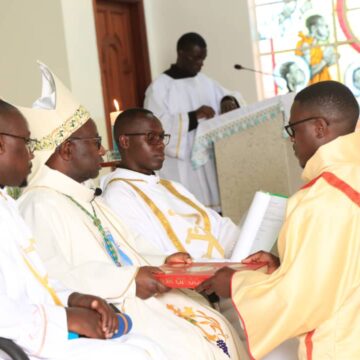

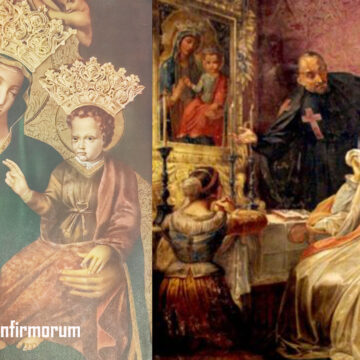
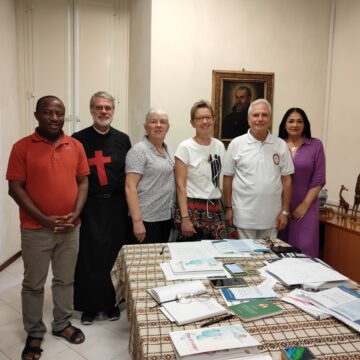

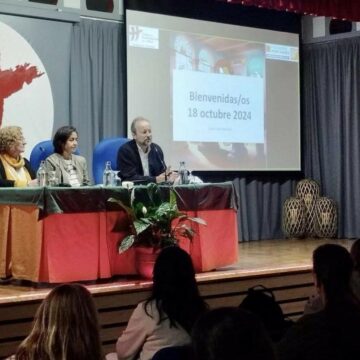
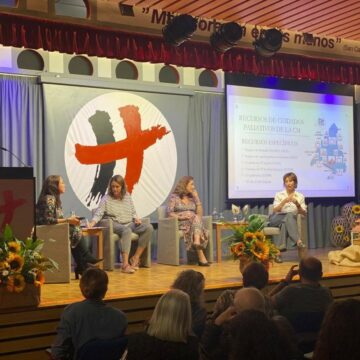
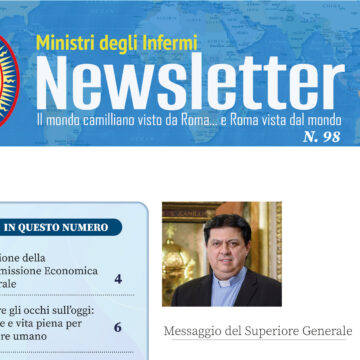
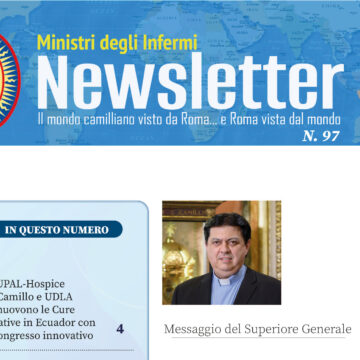
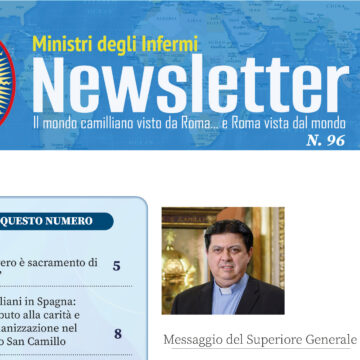
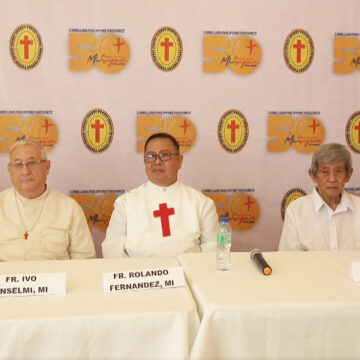
Camillians on Facebook
Camillians on Twitter
Camillians on Instagram